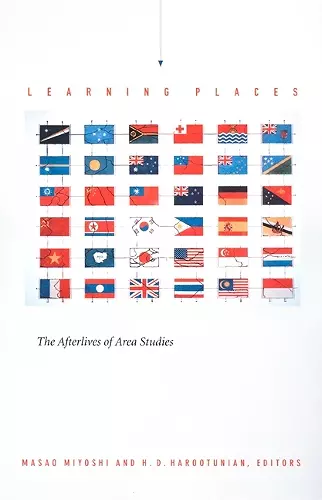Learning Places
The Afterlives of Area Studies
Harry Harootunian editor Masao Miyoshi editor
Format:Paperback
Publisher:Duke University Press
Published:15th Nov '02
Currently unavailable, and unfortunately no date known when it will be back

Under globalization, the project of area studies and its relationship to the fields of cultural, ethnic, and gender studies has grown more complex and more in need of the rigorous reexamination that this volume and its distinguished contributors undertake. In the aftermath of World War II, area studies were created in large part to supply information on potential enemies of the United States. The essays in Learning Places argue, however, that the post–Cold War era has seen these programs largely degenerate into little more than public relations firms for the areas they research.
A tremendous amount of money flows—particularly within the sphere of East Asian studies, the contributors claim—from foreign agencies and governments to U.S. universities to underwrite courses on their histories and societies. In the process, this volume argues, such funds have gone beyond support to the wholesale subsidization of students in graduate programs, threatening the very integrity of research agendas. Native authority has been elevated to a position of primacy; Asian-born academics are presumed to be definitive commentators in Asian studies, for example. Area studies, the contributors believe, has outlived the original reason for its construction. The essays in this volume examine particular topics such as the development of cultural studies and hyphenated studies (such as African-American, Asian-American, Mexican-American) in the context of the failure of area studies, the corporatization of the contemporary university, the prehistory of postcolonial discourse, and the problematic impact of unformulated political goals on international activism.
Learning Places points to the necessity, the difficulty, and the possibility in higher education of breaking free from an entrenched Cold War narrative and making the study of a specific area part of the agenda of education generally. The book will appeal to all whose research has a local component, as well as to those interested in the future course of higher education generally.
Contributors. Paul A. Bové, Rey Chow, Bruce Cummings, James A. Fujii, Harry Harootunian, Masao Miyoshi, Tetsuo Najita, Richard H. Okada, Benita Parry, Moss Roberts, Bernard S. Silberman, Stefan Tanaka, Rob Wilson, Sylvia Yanagisako, Mitsuhiro Yoshimoto
“Area studies is in crisis, seemingly rendered marginal and anachronistic in a globalizing world. Yet, paradoxically, knowledge of histories, geographies, cultures, ecologies, and geopolitical tensions has become crucial if the public is to understand the dangers as well as the promises of globalization. Miyoshi and Harootunian here assemble a talented group of scholars to probe deeply into this contradiction. They convincingly argue that area studies needs to be completely revamped if not dissolved into new knowledge structures within the academy if it is to fulfill its mission. This challenges all of us to rethink disciplinary allegiances and past ways of knowing in critical as well as constructive ways.”—David Harvey, author of Spaces of Hope and Spaces of Capital
“Bringing together an unusually wide range of concerns, Learning Places offers a theoretical account of Asian area studies and a moral and political critique of past and recurrent practices of epistemic violence. The political urgency of this type of work makes this a timely collection. This important book opens up a series of debates that must be had between the new humanities, area studies, and the disciplines.”—Michael Dutton, editor of Streetlife China
ISBN: 9780822328407
Dimensions: unknown
Weight: 771g
424 pages